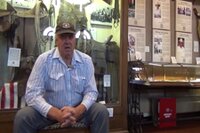| Title |
Dunbar, Don OH15_015 |
| Creator |
Weber State University, Stewart Library: Oral History Program |
| Contributors |
Dunbar, Don, Interviewee; Rands, Lorrie, Interviewer; Flinders, Tanner, Interviewer |
| Collection Name |
Utah Cowboy and Western Heritage Museum Oral Histories |
| Description |
The Utah Cowboy and Western Heritage Museum honors men and women whose lives exemplify the independence and resilience of the people who settled Utah, and includes artists, champions, entertainers, musicians, ranchers, writers, and those persons, past and present, who have promoted the Western way of life. Each year, the inductees are interviewed about their lives and experiences living the Western way of life. |
| Abstract |
The following includes the transcript and a video clip from an oral history interview with Don Dunbar. |
| Relation |
https://library.weber.edu/collections/oral_history |
| Image Captions |
Don Dunbar |
| Subject |
Cowboys; Rodeos; Livestock; Agriculture |
| Digital Publisher |
Stewart Library, Weber State University, Ogden, Utah, USA |
| Date |
2016 |
| Date Digital |
2018 |
| Temporal Coverage |
1910; 1911; 1912; 1913; 1914; 1915; 1916; 1917; 1918; 1919; 1920; 1921; 1922; 1923; 1924; 1925; 1926; 1927; 1928; 1929; 1930; 1931; 1932; 1933; 1934; 1935; 1936; 1937; 1938; 1939; 1940; 1941; 1942; 1943; 1944; 1945; 1946; 1947; 1948; 1949; 1950; 1951; 1952; 1953; 1954; 1955; 1956; 1957; 1958; 1959; 1960; 1961; 1962; 1963; 1964; 1965; 1966; 1967; 1968; 1969; 1970; 1971; 1972; 1973; 1974; 1975; 1976; 1977; 1978; 1979; 1980; 1981; 1982; 1983; 1984; 1985; 1986; 1987; 1988; 1989; 1990; 1991; 1992; 1993; 1994; 1995; 1996; 1997; 1998; 1999; 2000; 2001; 2002; 2003; 2004; 2005; 2006; 2007; 2008; 2009; 2010; 2011; 2012; 2013; 2014; 2015; 2016 |
| Item Size |
35p.; 29cm.; 2 bound transcripts; 4 file folders. 1 video disc: digital; 4 3/4 in. |
| Medium |
Oral History |
| Spatial Coverage |
Cache County, Utah, United States, https://sws.geonames.org/5772317 |
| Type |
Text; Image/MovingImage |
| Conversion Specifications |
Filmed using a Sony Camera. Transcribed with Express Scribe. Digitally reformatted using Adobe Acrobat XI Pro. |
| Language |
eng |
| Rights |
Materials may be used for non-profit and educational purposes, please credit University Archives, Stewart Library; Weber State University. |
| Source |
Dunbar, Don OH15_015; Weber State University, Stewart Library, University Archives |
| Format |
application/pdf; video/mp4 |
| ARK |
ark:/87278/s6cy11yz |
| Setname |
wsu_webda_oh |
| ID |
104229 |
| Reference URL |
https://digital.weber.edu/ark:/87278/s6cy11yz |
| Title |
Dunbar, Don OH15_015 |
| Creator |
Weber State University, Stewart Library: Oral History Program |
| Contributors |
Dunbar, Don, Interviewee; Rands, Lorrie, Interviewer; Flinders, Tanner, Interviewer |
| Description |
The Utah Cowboy and Western Heritage Museum honors men and women whose lives exemplify the independence and resilience of the people who settled Utah, and includes artists, champions, entertainers, musicians, ranchers, writers, and those persons, past and present, who have promoted the Western way of life. Each year, the inductees are interviewed about their lives and experiences living the Western way of life. |
| Relation |
https://library.weber.edu/collections/oral_history |
| Image Captions |
Don Dunbar |
| Biographical/Historical Note |
The following is an oral history interview with Don Dunbar, conducted June 8, 2016 by Lorrie Rands and Tanner Flinders. Dunbar discusses his father, Marvin Dunbar, and his experiences growing up and participating in rodeos. |
| Subject |
Cowboys; Rodeos; Livestock; Motion pictures |
| Digital Publisher |
Stewart Library, Weber State University, Ogden, Utah, USA |
| Date |
2016 |
| Date Digital |
2018 |
| Temporal Coverage |
1910-2016 |
| Item Size |
35p.; 29cm.; 2 bound transcripts; 4 file folders. 1 video disc: digital; 4 3/4 in. |
| Medium |
Oral History |
| Spatial Coverage |
Cache County, Utah, United States, https://sws.geonames.org/5772317 |
| Type |
Text; Image/MovingImage |
| Conversion Specifications |
Filmed using a Sony Camera. Transcribed with Express Scribe. Digitally reformatted using Adobe Acrobat XI Pro. |
| Language |
eng |
| Rights |
Materials may be used for non-profit and educational purposes, please credit University Archives, Stewart Library; Weber State University. |
| Source |
Dunbar, Don OH15_015; Weber State University, Stewart Library, University Archives |
| Format |
application/pdf |
| Setname |
wsu_webda_oh |
| ID |
104435 |
| Reference URL |
https://digital.weber.edu/ark:/87278/s6cy11yz/104435 |





